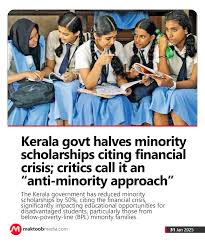The Kerala government has announced a 50% reduction in minority scholarships, citing financial constraints—a move that could significantly impact students from underprivileged backgrounds, particularly those from below-poverty-line (BPL) minority families, reported the Hindu.
According to an official order issued on January 15, funding for nine out of 11 scholarship programs under the Department of Minority Affairs—including the Prof. Joseph Mundassery, Mother Teresa, and APJ Abdul Kalam scholarships—has been slashed in half. Despite an allocation of ₹87.63 crore for scholarships in the 2024-25 financial year, only 2.69% of the funds have been disbursed, with just two months left in the fiscal year.
The decision comes from the Left-led Kerala government, headed by Chief Minister Pinarayi Vijayan, who has frequently criticized the Union government for allegedly undermining minority rights. While the state government insists that the cuts are based on financial priorities, the drastic reduction in scholarships for minority students has raised serious concerns about the administration’s commitment to social justice and inclusive education.
Among the most affected schemes is the Prof. Joseph Mundassery Scholarship, which has been a vital financial aid program for academically bright students from Muslim, Sikh, Jain, and Parsi communities. The scholarship prioritizes BPL students, as well as economically weaker students from above-poverty-line (APL) households. This year, ₹5.2 crore had been allocated, offering ₹10,000 to students securing A+ in all SSLC subjects and ₹15,000 to those scoring 80% in higher secondary or 75% in vocational higher secondary courses. The funding cut may force many talented yet financially disadvantaged students to abandon their education.
Similarly, the APJ Abdul Kalam Scholarship, which supports minority students in higher education, has also been reduced by half. This scholarship, which provides ₹6,000 to students gaining admission to government-approved institutions on merit, particularly benefits BPL students, with 30% of the funds reserved for female candidates. The cut is expected to disproportionately affect young women from marginalized communities, many of whom already struggle to access higher education.
The Mother Teresa Scholarship, which provides financial aid to Christian, Sikh, Buddhist, Jain, and Parsi students pursuing diploma courses in government nursing and paramedical institutions, has also been affected. Other impacted programs include financial assistance for students studying abroad, civil service coaching support, and UGC coaching reimbursements.
The decision has sparked widespread outrage. The Congress party took to social media to criticize the move, posting on X (formerly Twitter), “Like the BJP governments, Kerala’s ‘CJP’ government too hits minority students hard by cutting their scholarships to half.”
Muslim Students Federation (MSF) state president P.K. Navas condemned the move in a Facebook post, alleging that it was part of a “dubious alliance” between the CPM and BJP to undermine the constitutional rights of minorities. He argued that the government’s decision reflected a pattern of neglect toward minority welfare.
Students Islamic Organisation of India (SIO) state president Adv. Abdul Vahid also denounced the cuts, calling them a continuation of the Pinarayi government’s anti-minority policies. “If the decision is not reversed, there will be widespread protests,” he warned.
The drastic reduction in scholarships is expected to have a long-term impact on the educational aspirations of students from minority communities in Kerala. Rights groups and student organizations have raised concerns that such budgetary cuts could widen educational inequality, push many students out of formal education, and limit access to career advancement opportunities.
While the state government defends its decision as a necessary financial adjustment, critics argue that cutting education funds for minorities undermines Kerala’s reputation for inclusive governance. They stress the need for urgent intervention to restore scholarship funding and protect the future of thousands of deserving students.




